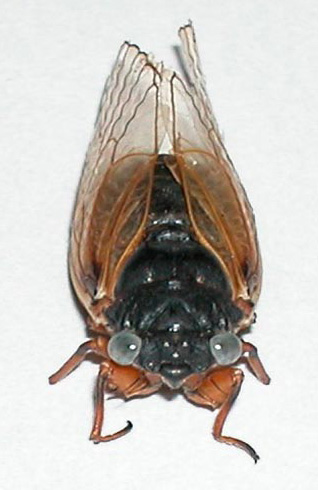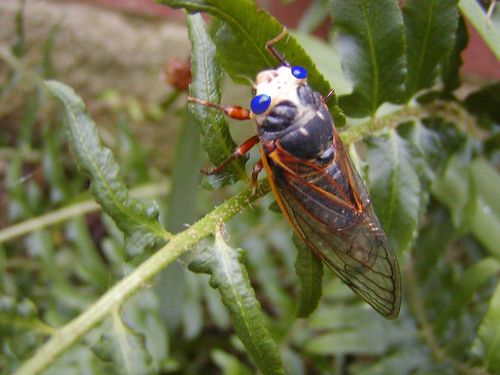
Have you heard the latest buzz going round that scientists at Vanderbilt are paying as much as $3,000 for specimens of the rare blue-eyed cicada?
If you have, I hope you haven’t spent a lot of time checking out cicadas’ eye color, because it is a hoax. Most cicadas have red eyes, but a very small percentage do have blue or white eyes, confirms Vanderbilt biologist Patrick Abbot, “but the idea of any one paying for them is a recurrent myth.”
The myth dates back at least to 2004. According to Ramona Demme, writing about cicadas in Oberlin College’s Wilder Voice, there was a similar hoax in 2004 in Baltimore during a cicada invasion. “… word began spreading that biologists at John Hopkins University were offering $100 prizes to anyone that could find a blue-eyed cicada,” she wrote.
“Cicadas’ eyes are supposed to be red, and people scoured lawns, fields, and streets in towns all around Baltimore and its suburbs looking for these different ones, these ones that are so rare only one in a million is like them,” Demme wrote. “Nobody knows who started the rumor, but it wasn’t true. In the forties, a biologist at John Hopkins paid neighborhood kids a quarter for every lightning bug they could catch, so maybe it developed out of that. No one knows.”
Demme’s account is supported by a May 2004 article in the Baltimore Sun titled “’Cicada cash’ rumor squashed.” The story reports that even though the biology department at Johns Hopkins was not offering an award for blue-eyed cicadas it was inundated with calls from people who had heard the rumor.
The rumor appears to have become elevated to the level of modern folklore, surfacing along with each new cicada emergence. This year it appears to be our turn. The rumor has hit the Nashville area hard enough for the Tennessean to take notice. In a May 31 story headlined “Vandy not paying for blue-eyed cicadas,” the paper’s website stated, “It was the talk of weekend barbecues, Twitter and Facebook – Did you know Vanderbilt University is paying $3,000 for a blue-eyed cicada?” As a result, staff at Vanderbilt’s biological sciences department report that they have gotten a number of calls.
Meanwhile, some people have been having some fun with the rumor. A couple of years ago, a photographer posted a clearly Photoshopped image of an alleged blue-eyed cicada on Flickr with the caption “There was a rumor going around that a blue eyed Cicada could fetch a million dollars…Pay up suckas!”
If you are interested in seeing one of these rare insects in action, an amateur videographer has posted a video of a blue-eyed cicada on You Tube.
The folks at Cicada Mania had a photo contest in 2007 for the best photo of a blue-eyed cicada, included above. This year they have a similar contest for the best video of a white-eyed cicada. The winner gets a cicada button. In addition, the site sells a number of cicada souvenirs, including t-shirts and mugs with various logos and photos, including one of a blue-eyed cicada.
Perhaps it’s the hard economic times, but 2011 is definitely the year when cicadas are coming into their own as a food supplement, according to Cicada Mania. To support their contention, they link to a story in the Harrisburg, Illinois Daily Register that provides a recipe for German Chocolate Cicada Cake.
The recipe comes from the University of Cincinnati Clermont College Biology department, which has a cicada recipe website, that also includes cicada-portobello quiche, cicada sauerbraten with spatzle, cicada cheese wontons and cicada granola chews.
